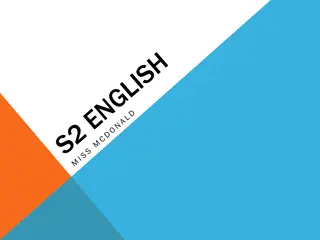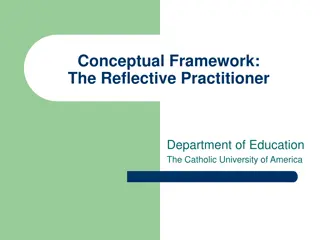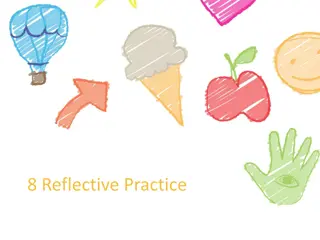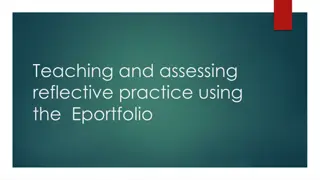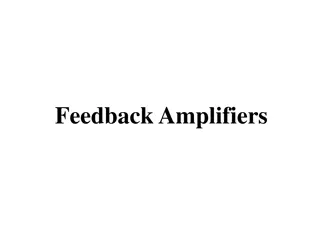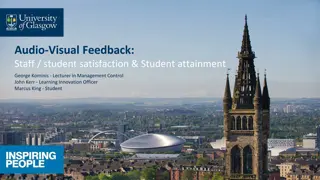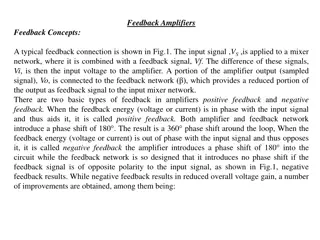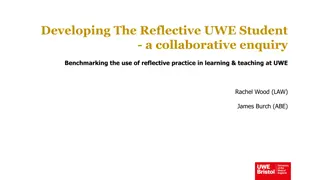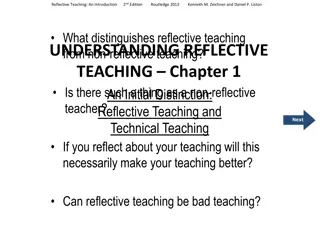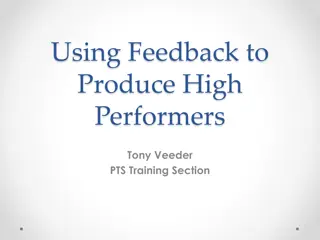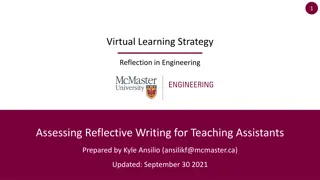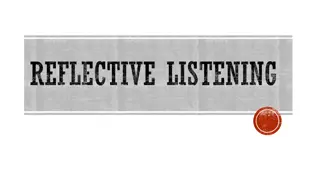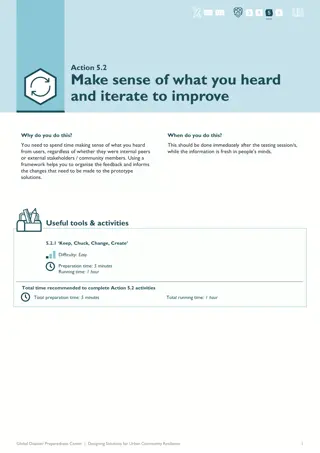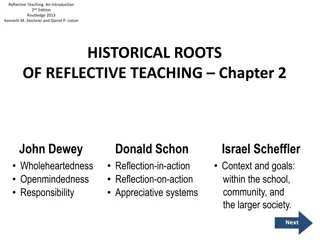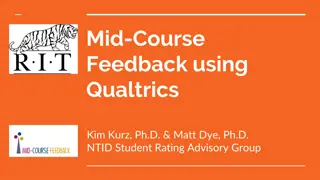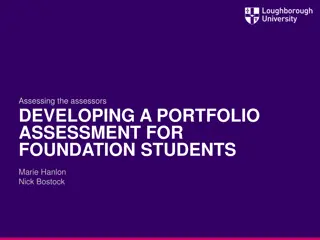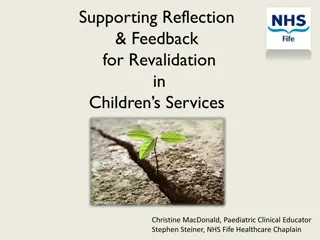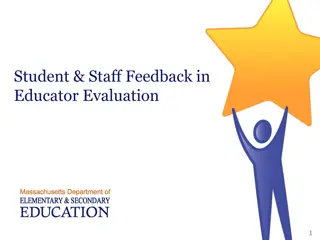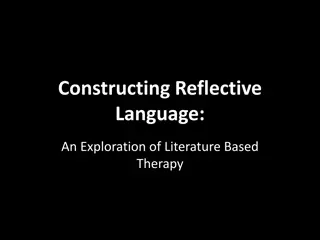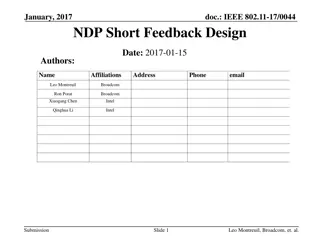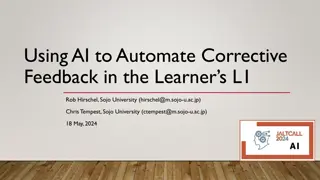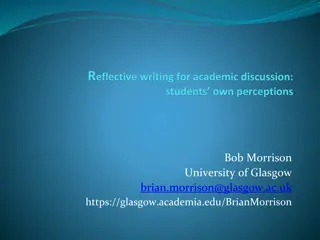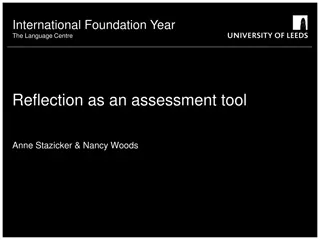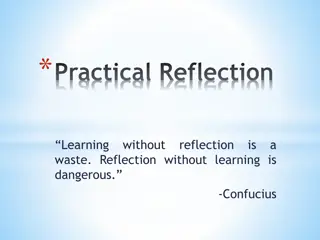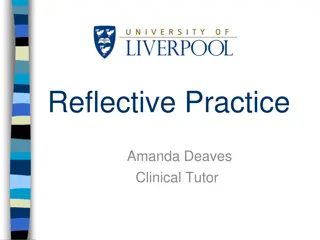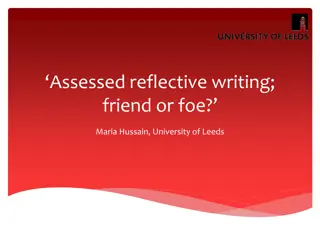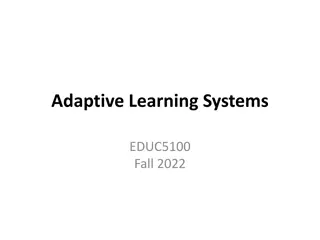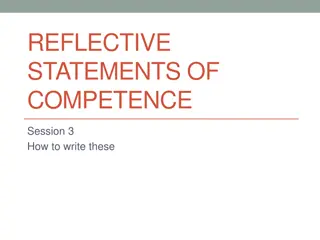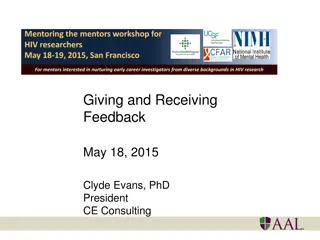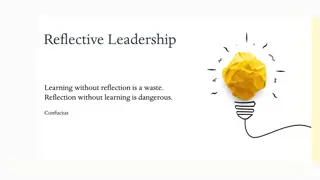Enhancing Student Learning Through Effective Feedback Strategies
Effective feedback plays a crucial role in improving student learning outcomes by providing specific information that students can use to enhance their performance. This content explores the importance of feedback, examples of good feedback practices, qualities of good feedback, and what components
5 views • 16 slides
Exploring Personal Reflective Writing Through Two Engaging Passages
Personal reflective writing involves exploring your reactions to events or experiences, delving into your thoughts and emotions to provide a unique perspective. This form of writing goes beyond mere storytelling and requires genuine reflection and introspection to create engaging and authentic narra
0 views • 39 slides
Exploring Reflective Practice in Education: A Conceptual Framework
Delve into the concept of reflective practice within the field of education through the reflective practitioner framework at The Catholic University of America's Department of Education. Understand how reflective practitioners consider the consequences of educational decisions for constant refinemen
1 views • 30 slides
Enhancing Professional Practice through Reflective Practice
Reflective practice is an essential ongoing process in professional practice with children and families. It involves honest, deep, and critical thinking to improve outcomes, challenge assumptions, and seek collaboration. Through reflective practice, educators can recognize good practices, address ch
0 views • 35 slides
Effective Feedback Strategies for Learning Enhancement
Feedback plays a crucial role in the learning process. This session focuses on strategies for providing effective feedback to improve learning outcomes, course, and assignment design, best practices, and tools for efficient feedback delivery. Understanding the importance of prompt feedback and diffe
3 views • 20 slides
Enhancing Reflective Practice Using Eportfolios
Reflective practice is a metacognitive process crucial for self-understanding and future action. Utilizing Eportfolios in teaching and assessing reflection helps trainees develop critical thinking skills. The session plan includes discussion on educator comments, exploring Eportfolios, and strategie
0 views • 16 slides
Understanding Feedback Amplifiers: Structure, Properties, and Topologies
Electronic circuits rely heavily on feedback mechanisms, particularly negative feedback, for various purposes such as desensitizing gain, reducing distortion, controlling impedance, and improving amplifier bandwidth. This article explores the general structure of feedback, properties of negative fee
0 views • 68 slides
Enhancing Feedback Practices with Audio-Visual Technology: A Study on Student Satisfaction and Attainment
This presentation delves into the implementation of Audio-Visual Feedback (AVF) technology to improve assessment feedback practices in an educational institution. The study explores the impact of AVF on student satisfaction levels compared to traditional written feedback, as well as its influence on
0 views • 21 slides
Understanding the Importance of Feedback in Achievement Enhancement
Feedback plays a crucial role in encouraging or discouraging behavior, making it essential to provide constructive feedback that focuses on growth and improvement. Improper feedback can lead to incompetence in the workplace. Learn about the definition of feedback, how to give feedback effectively, a
2 views • 22 slides
Understanding Feedback Amplifiers in Electronic Circuits
Feedback amplifiers play a crucial role in electronic circuits by providing mechanisms for controlling gain, stability, and overall performance. There are two basic types of feedback - positive and negative, each offering distinct advantages. The four ways of connecting feedback signals involve volt
1 views • 18 slides
Exploring Reflective Practice in Learning & Teaching at UWE
The collaborative enquiry at UWE delves into the use of reflective practice in various professional courses, highlighting challenges and the importance of reflective capacity. A diverse group engages in iterative cycles of input, conversation, reflection, and refreshments to benchmark and enhance re
0 views • 15 slides
Understanding Reflective Teaching: An Introduction
Reflective teaching involves actively questioning educational goals, classroom contexts, and personal assumptions. It encourages teachers to play leadership roles in curriculum development and school reform. The movement towards reflective practice rejects top-down educational reform, emphasizing te
0 views • 9 slides
Enhancing Feedback Strategies in ELA Learning Project Day
Refine understanding of ELA, engage with student exemplars, and design constructive feedback in a structured agenda. Activities include generating feedback, digging deeper into feedback processes, and considering the impact of timely and specific feedback on student growth in learning and skills. Co
0 views • 31 slides
Exploring Reflective Written Assignments in Statistics Courses
Introducing reflective written assignments in a statistics course can be beneficial for students, as shown by research on the impact of guided reflections. By incorporating reflective tasks alongside traditional assessments, students can enhance their transferable skills and improve their ability to
0 views • 36 slides
Effective Feedback Strategies for Resident Teachers
Effective feedback is critical for the growth of resident teachers. This guide covers types of feedback, why it's important, what makes feedback effective, behaviorally anchored rating scales, models for giving feedback, and key tips for delivering feedback successfully.
0 views • 14 slides
Effective Feedback Strategies for High Performance
Feedback plays a crucial role in helping individuals improve performance and reach their full potential. From providing helpful feedback to reinforcing desired behaviors, this guide explores various strategies, including redirection, reinforcement, and F.A.S.T. feedback, to enhance workplace perform
0 views • 21 slides
Benefits of Reflective Practice and Critical Reflection Models
Reflective practice is essential for deep learning and personal growth. This content explores the benefits of reflective practice, including increased learning, identifying strengths and areas for improvement, and acquiring new knowledge. It also introduces the DEAL model for critical reflection, em
0 views • 20 slides
Enhancing Reflective Writing in Engineering: A Guide for Students and Teaching Assistants
This course module series aims to improve reflective writing skills for engineering students, teaching assistants, and instructors. It covers the definition of reflection, its importance in learning and professional development, and practical strategies for effective written reflection. The content
0 views • 36 slides
Enhancing Postgraduate Academic Writing: Feedback Collaboration Model
Developing a collaborative model for postgraduate academic writing courses involves understanding the role of feedback, focusing on content feedback, and exploring the intersections between discipline specialist and writing tutor feedback to improve academic writing abilities. Feedback offers valuab
1 views • 27 slides
Enhancing Communication Through Reflective Listening Techniques
The Reflective Listening process fosters effective communication by showing understanding, providing feedback, and guiding emotional expression. Skills like attending and reflective skills, as well as non-verbal cues like eye contact and gestures, play a crucial role. Silence can also be a powerful
0 views • 11 slides
Iterative Feedback Framework for Prototype Improvement
The iterative feedback framework involves making sense of user feedback using the Keep, Chuck, Change, Create (KCCC) model to iterate and enhance prototype solutions. This process helps organize input from testing sessions, informing necessary modifications for better outcomes. The framework emphasi
1 views • 26 slides
Historical Roots of Reflective Teaching: Dewey and Schon's Perspectives
This content discusses the historical roots of reflective teaching, focusing on the contributions of John Dewey and Donald Schon. Dewey emphasized open-mindedness, wholeheartedness, and responsibility as integral to reflective action, while Schon introduced the concepts of reflection-on-action and r
0 views • 6 slides
Understanding Mid-Course Feedback Using Qualtrics
Mid-Course Feedback (MCF) is a valuable process that allows students to provide feedback on their courses mid-semester, impacting teaching strategies, communication, materials, and more. This feedback benefits both students and instructors by improving teaching effectiveness, student satisfaction, a
0 views • 21 slides
Enhancing Student Performance Through Portfolio Assessment in Foundation Programs
Developing a portfolio assessment methodology for foundation students aimed at improving their writing, critical thinking, and reflective skills. The portfolio includes a reflective journal, annotated bibliography, and essay plan to scaffold sub-skills for major assessments. Results show significant
0 views • 16 slides
Enhancing Reflective Practice and Feedback for Revalidation in Pediatric Services
Explore the importance of reflection and feedback in pediatric services to enhance future patient care and professional development. Sessions focus on promoting reflective practice through e-portfolios, group discussions, and individual sessions. Key learnings include building resilience, fostering
0 views • 7 slides
Importance of Student and Staff Feedback in Educator Evaluation
Student and staff feedback plays a crucial role in educator evaluation, providing valuable insights into areas of strength and growth. Informed by evidence such as surveys, observations, and artifacts, feedback helps educators tailor their practice, fostering two-way communication and professional d
0 views • 14 slides
Understanding Cascade Control Systems in Industrial Processes
Cascade control systems play a crucial role in improving process control efficiency by incorporating feedback loops within feedback loops. This type of control architecture helps to better handle disturbances and variations in the process by creating secondary loops that monitor specific parameters.
0 views • 8 slides
Diving into Reflective Language: A Journey through Literature-Based Therapy
Explore the power of reflective language in literature-based therapy through thought-provoking quotes from authors like Stephen King, Chimamanda Ngozi Adiche, and Audre Lorde. Discover how stories can empower and humanize, providing new perspectives and shared experiences to enhance one's vocabulary
0 views • 7 slides
IEEE 802.11-17/0044 NDP Short Feedback Design
The document discusses the need for short simultaneous feedback from multiple STAs in IEEE 802.11 systems for improved efficiency. It introduces the NDP feedback mechanism and proposes a signaling technique to efficiently collect feedback from a high number of STAs. The mechanism involves UL MU tran
0 views • 19 slides
AI Automation for Corrective Feedback in Language Learning
Exploring the utilization of AI technology to automate and enhance corrective feedback in language learning, addressing challenges such as time constraints, delayed feedback, and student comprehension. Introduction of a new AI text tool by Marcus Green for accessible and effective feedback provision
0 views • 13 slides
Enhancing Academic Discussion Through Reflective Writing
Explore the process of reflective writing for academic discussions, focusing on students' perceptions and guided reflections. The course structure, purpose, and key aspects of reflective writing are discussed, offering insights on improving academic discussion skills. Dive into meaning-making proces
0 views • 19 slides
IEEE 802.11-19/0709r0 - Immediate and Delayed Feedback May 2019
The document discusses immediate and delayed feedback mechanisms in IEEE 802.11-19/0709r0, focusing on parameters, feedback types, and ranging options. It explores variations in feedback direction and types, proposing options for phase shift feedback and distinguishing between RSTA-to-ISTA and ISTA-
0 views • 6 slides
Enhancing Foundation Year Student Skills Through Reflective Assessment
This comprehensive study explores the challenges in teaching Foundation Year students and introduces a reflective assessment tool to enhance critical thinking, autonomy, and academic skills. The initiative involved implementing a reflective journal task, assessing student progress, and encouraging s
0 views • 15 slides
Enhancing Learning Through Reflective Practices: A Comprehensive Guide
Explore the significance of reflection in professional development, understanding various reflective practices, and engaging in activities to foster individual and group reflection. Discover the dynamics of cyclical learning, the cognitive and affective aspects of reflection, frameworks for improvem
0 views • 12 slides
Understanding Reflective Practice in Physiotherapy
Increase knowledge of reflective practice, review reflection models, grasp critical reflection's role in clinical placement, comprehend reflection's significance in physiotherapy practice, and prepare for assignments. Definitions of reflective practice, reasons for reflection, CSP expectations, deve
0 views • 27 slides
Exploring the Value of Reflective Writing in Academic Development
Reflective writing plays a crucial role in enhancing learning experiences by encouraging learners to critically examine their thoughts and decisions. This assessment discusses the potential of reflective writing in academic settings, identifies barriers to its full engagement, and presents practical
0 views • 25 slides
Understanding Feedback in Learning Systems
Exploring the role of feedback in educational settings, this content delves into the concept of providing information to learners by various agents. It discusses the importance of feedback in guiding learning progress, highlighting examples of correctness feedback and correct answer feedback. The be
0 views • 66 slides
Reflective Statements of Competence: Writing Guidelines and Examples
Explore how to write reflective statements of competence for teaching practices, focusing on the CDA Competency Standards. Learn about structuring competency goal statements and functional areas, with detailed examples included. Enhance your understanding of creating a safe, healthy learning environ
0 views • 13 slides
Feedback and Mentoring Workshop for HIV Researchers
Mentoring workshop for HIV researchers focusing on giving and receiving feedback, nurturing early career investigators, and working with faculty continuum. The workshop offers insights on feedback exercises, assumptions, and rhetorical questions about feedback. Participants are encouraged to reflect
0 views • 33 slides
Understanding Reflective Leadership: Learning and Application
Reflective leadership emphasizes the importance of combining learning with thoughtful reflection. It involves active consideration of beliefs and knowledge for continual growth. Traits like open-mindedness, responsibility, and whole-heartedness play key roles in effective reflection. Through experie
0 views • 13 slides

